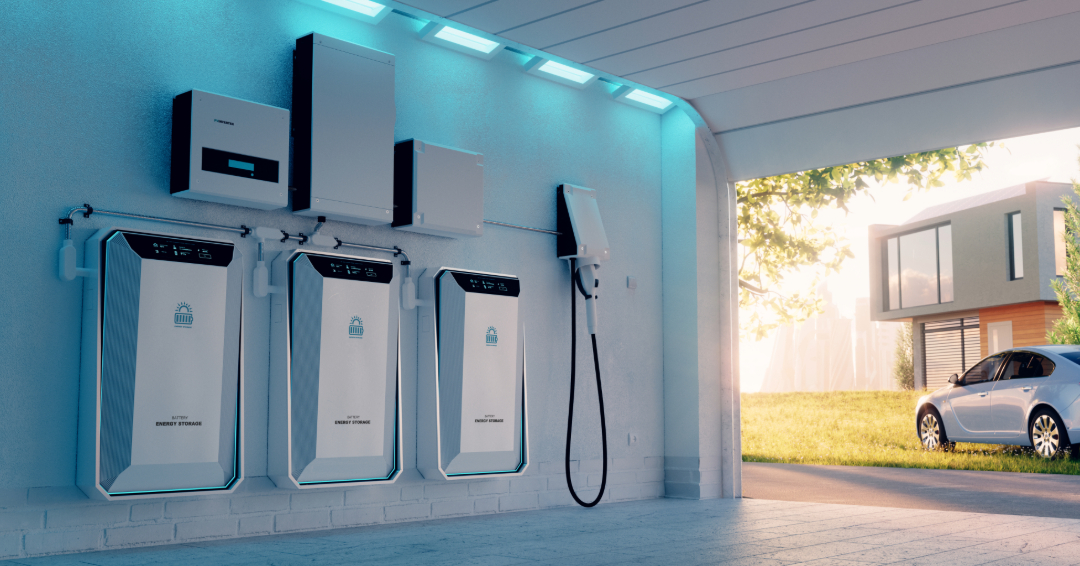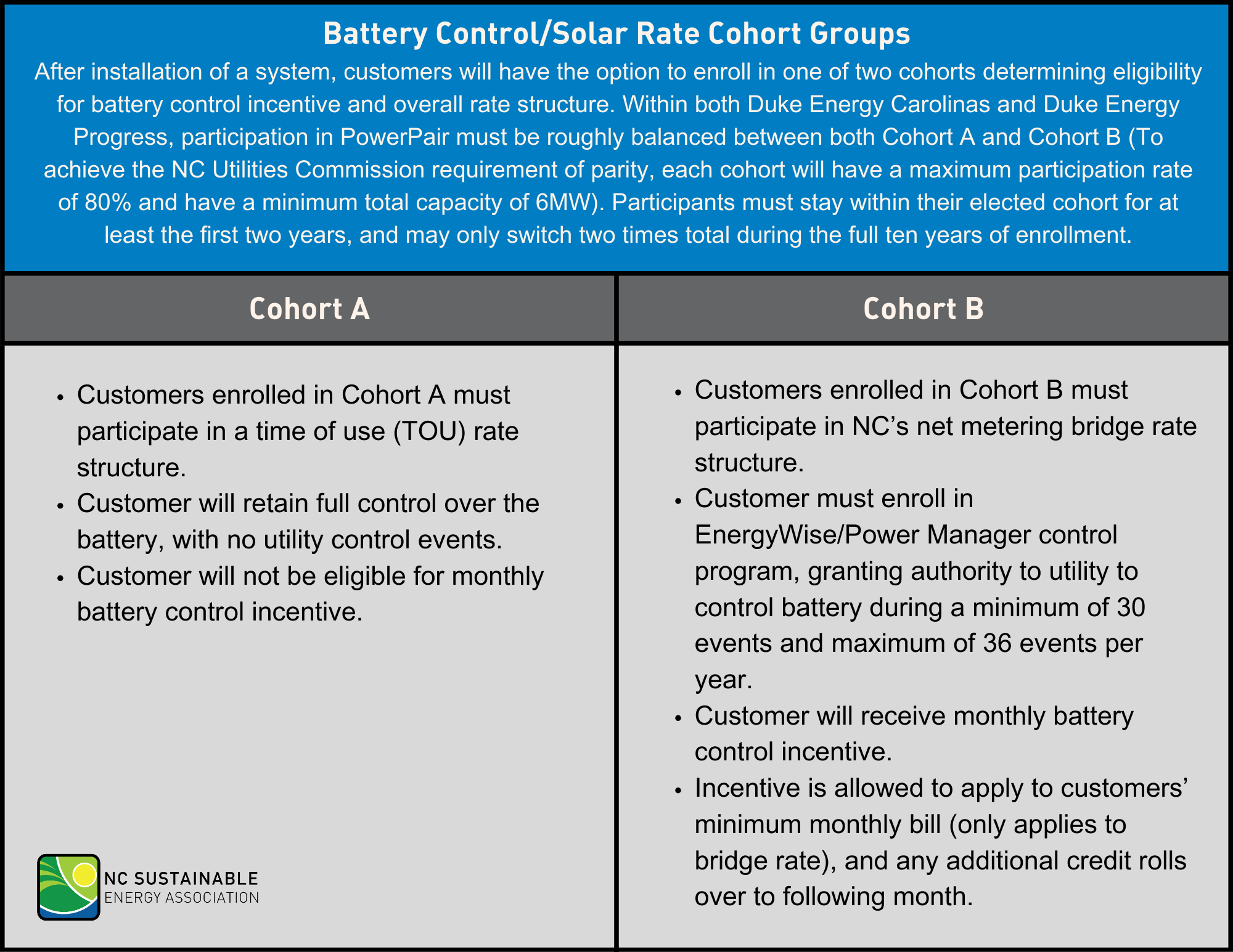New residential solar and battery storage incentive program approved in January, takes effect in May.

On January 11, the NC Utilities Commission approved a landmark pilot program called ‘PowerPair’ designed to lower the costs of new solar and battery storage systems for residential customers in Duke Energy Carolinas and Duke Energy Progress utility territories across North Carolina. For customers considering a new solar and storage system, it’s estimated that this program could help to cover between 17-30% of total costs (and up to $9,000 total) before factoring the additional savings attributed to the federal 30% tax credit available via the Inflation Reduction Act. All in all, this could be a significant driver for rooftop solar adoption across the state of North Carolina, and a great option for homeowners who have been considering solar for some time.
Background and Timeline:
This program was first authorized as part of an order issued by the NC Utilities Commission in March 2023, outlining the overall changes to net energy metering for residential customers which took effect October 1, 2023. However, that March 2023 order did not provide final guidance for the solar and battery incentive program, and instead directed Duke Energy to file additional details on a proposed program and the incentives that would be available to customers. After receiving the program proposal filing from Duke late Summer 2023, we’ve been awaiting final Commission authorization in order to move forward with this pilot program.
Then came January 11, 2024, in which the order was issued by the NC Utilities Commission, approving the solar and storage pilot, requiring Duke to file revised tariffs and terms and conditions by February 10, and that those tariffs would have an effective date of 120 days after the date of the order – on or around May 10, 2024.
With that order, we now have a program start date in May of 2024.
It is important to note that this is designated as a pilot program by the NC Utilities Commission. As with most pilot programs, there are limited capacities and enrollment opportunities available before a potential expansion into full-blown programs in the future. With PowerPair, there is a program limit of 30,000 kW of solar capacity in both Duke Energy Carolinas and Duke Energy Progress each respectively. Once the capacity limit has been reached in each territory, additional applicants will be placed on a waiting list in first come, first served order. For customers who do elect to participate in the program and are eligible before the capacity limit is reached, they will be required to participate for at least ten years. Should a customer decide to leave the program before the ten years are up, they will be charged an early termination fee, unless termination is for good cause, such as a circumstance beyond their control.
This program includes various levels of incentives dependent upon the rate structure a customer is enrolled in and the utility’s ability to control a customer’s battery during a stated number of events each year. The full details of the incentives and programs are as follows:
Program Details:
Solar and Storage Incentives: The new PowerPair incentive for residential solar and battery customers encompasses both an upfront and ongoing incentive based on the size of a system and rate structure. All in all, customers could receive up to a one-time $9,000 total rebate to help offset the installation cost of solar and batteries. Customers are eligible for a $0.36/watt incentive on solar panels, limited to a max installation capacity of 10kW and capped at $3,600 per residence. For battery storage, customers are eligible to receive $400/kWh, limited to a maximum installed capacity of 13.5 kWh and capped at $5,400 per residence (Only newly installed systems are eligible for incentives, [previous solar customers now adding battery storage would not be eligible for this incentive]). System sizes may exceed the stated incentive capacity above, however, the incentive will only apply to the portion of the system under the cap.
Battery Control Incentive: After installation of your residential solar and battery storage system, if a household elects to participate in Cohort B (outlined below) they will be eligible to receive a monthly incentive of $6.50/kW of the discharge nameplate value for the battery storage system (multiplied by a 70.9% capability factor). In order to receive this incentive a customer agrees to allow the utility to control/discharge their battery a minimum of 30 events and a maximum of 36 events per year. (This incentive is applicable to each battery if more than one is installed and is not capped). See the chart below for an explanation of the cohorts that customers will have an option to enroll in, dictating the battery control incentive and overall rate structure for their solar system.

Timing: The program has an expected effective date of May 10, 2024, though see below for key implementation dates.
Initial enrollment for the incentive program will open for a period of four weeks beginning on May 10, 2024, and ending on June 7, 2024. At the end of the four-week enrollment period, Duke Energy will pause new enrollments for two weeks starting on June 7, 2024, until enrollment reopens on a first come, first served basis. In order for projects to be eligible for the incentives in the first round of selection, the system must be operational within either 90 days prior to or after May 10th. If there is still capacity remaining in the program, Duke Energy will reopen enrollment starting on June 21, 2024, until capacity is reached or the 3-year enrollment period ends. For the ongoing incentives that compensate customers on a monthly basis for utilizing their batteries as a grid asset, enrollment starts on July 9, 2024 (Power Manager – Duke Energy Carolinas or EnergyWise Homes – Duke Energy Progress) [Of note – customers do not have to participate in PowerPair to be eligible to participate in these programs).
Selection: After the initial enrollment period ends, Duke Energy will pause enrollments for two weeks to correct any defects found in customer applications. After this two week pause, Duke Energy will utilize a third party to conduct a random selection process to assign all applications a spot in line for the incentives. Those applications will then be processed in order and assigned to the appropriate cohort. If there are any capacity or participation limitations based on total customer participation or customer preference between cohorts, customers will be placed on a waiting list (Notably – customers placed on the waiting list will not lose their eligibility for incentives. If capacity remains in the unselected cohort, the customer will be allowed to switch their choice or remain on the waiting list).
Length and Capacity: Under the PowerPair program, each Duke Energy utility (Duke Energy Progress and Duke Energy Carolinas) has an overall program capacity of 30MW (for reference the current average PV system size in North Carolina is 4kW). Enrollment in the program will end once these capacities are reached or at the end of three years from program start date. Once enrolled, households are required to participate in the program for at least ten years, unless termination is for good cause (early termination would trigger a one-time charge equal to one minus the number of months since initial participation divided by 120 multiplied by the applicable incentive). Additionally, participants must stay within their chosen cohort for at least the first two years before switching and may only switch up to two times total during the ten years.
Key Dates:
- March 2024 – Duke Energy’s PowerPair website live
- May 10, 2024 – June 7, 2024 – Initial PowerPair application expected to open
- June 21, 2024 – PowerPair enrollment window reopens on a first come, first served basis
- July 9, 2024 – Customers may begin enrolling an eligible battery storage system
Additional information about the PowerPair program can be found on NCSEA’s Consumer Guide to Solar website and Duke Energy’s PowerPair webpage.
